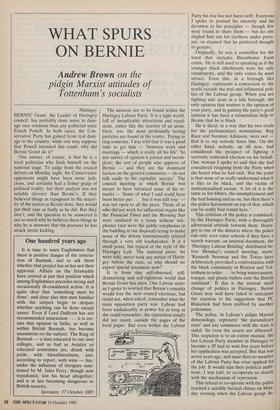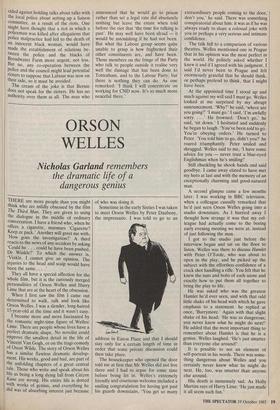WHAT SPURS ON BERNIE
Andrew Brown on the
pidgin Marxist attitudes of Tottenham's socialists
Haringey BERNIE Grant, the Leader of Haringey council, has probably done more to dam- age race relations than any politician since Enoch Powell. In both cases, the Con- servative Party has gained from real dam- age to the country; while one may suppose that Powell intended this result, why did Bernie Grant do it?
One answer, of course, is that he is a local politician who finds himself on the national stage. To judge from the council debate on Monday night, his Conservative opponents might have been more judi- cious, and certainly had a firmer grasp of political reality; but their analysis was not notably cleverer than Bernie's. If they believed things as repugnant to the major- ity of the nation as Bernie does, they would put their case as badly as he did. But they don't; and the question to be answered is not so much why he believes these things as why he is unaware that the postures he has struck invite kicking.
The answers are to be found within the Haringey Labour Party. It is a tight world, full of inexplicable attractions and repul- sions, rather like the interior of an atom. Here, too, the most profoundly boring particles are found in the centre. Trying to ring someone, I was told that it was a good time to get him — 'between work and meetings — which is really all his life'. So any survey of opinion is partial and incom- plete; the sort of people who approve of Bernie — and they are the dominant faction on the general committee — do not talk easily to the capitalist `rneejer'. The council meeting at which Bernie was meant to have retracted some of his re- marks — 'Some of what I said could have been better put . . . but it was still true' was not open to all the press. Those of us who did not work for influential organs like the Financial Times and the Morning Star were confined to a room without tele- phones (nor were the public telephones in the building at our disposal) trying to make sense of the debate intermittently relayed through a very old loudspeaker. It is a small point, but typical of the style of the Haringey Left. The national press, we were told, never took any notice of Harin- gey before the riots, so why should we expect special treatment now?
It is- from this self-obsessed, self- dramatising and self-righteous world that Bernie Grant has risen. One Labour activ- ist I spoke to worried that Bernie's remarks would lose the next council elections, but could not, when asked, remember what the main opposition party was. Labour had been unshakeably in power for as long as she could remember; the opposition simply did not count, outside the pages of the local paper. But even within the Labour Party his rise has not been swift. Everyone I spoke to praised his sincerity and his devotion to his principles — though few were found to share them — but no one singled him out for coolness under press- ure, or claimed that he preferred thought to gesture.
Originally, he was a councillor for the ward that includes Broadwater Farm estate. He is still used to speaking as if the younger black inhabitants were his only constituents, and the only voters he must attract. Even this, in a borough like Haringey, represents a concession to the world outside the real and influential poli- tics of the Labour group. When you are fighting safe seats in a safe borough, the only opinion that matters is the opinion of your party, and in gaining the party's good opinion it has been a tremendous help to Bernie that he is black.
He is liked, in a way that his two rivals for the parliamentary nomination, Reg Race and Norman Atkinson, were not that is to say nobody hates him. On the other hand, nobody, up till now, had considered the prospect of fighting a seriously contested election on his behalf. One woman I spoke to said that she had considered resigning from the Party when she heard what he had said. 'But the point is that none of us really understand what it is like to be black, and the victim of institutionalised racism. A lot of it is the same as for whites, the unemployment and the bad housing and so on, but then there's the police harassment on top of that, which can be really bad round here.'
This criticism of the police is combined, by the Haringey Party, with a thoroughly adversarial attitude towards them. Harin- gey is one of the districts where the police can only ever enter schools if they have a search warrant; an internal document, the `Haringey Labour Briefing' distributed be- fore Monday's council meeting, starts: `Kenneth Newman and the Tories have deliberately provoked a confrontation with the black community in Brixton and Tot- tenham in order . . to bring watercannon, teargas, and plastic bullets onto the British mainland.' If this is the normal small change of politics in Haringey, Bernie Grant may well have failed to anticipate the reaction to his suggestion that PC Blakelock had been stabbed by another policeman.
The police, in Labour's pidgin Marxist demonology, represent the paramilitary state' and any commerce with the state is sinful. So even the courts are abhorred. This suspicion is to an extent mutual; the last Labour Party member in Haringey to become a JP had to wait five years before her application was accepted. But that was seven years ago, and since then no member of the Labour Party has even applied for the job. It would ruin their political ambi- tions, I was told, to co-operate so closely with the mechanism of repression. This refusal to co-operate with the police reached a suitably farcical climax on Mon- day evening when the Labour group de-
cided against holding talks about talks with the local police about setting up a liaison committee, as a result of the riots. One might have thought that a riot in which a policeman was killed after allegations that police malpractice had led to the death of an innocent black woman, would have made the establishment of relations be- tween the police and the blacks of Broadwater Farm more urgent, not less. But no, any co-operation between the police and the council might lead potential rioters to suppose that Labour was now on their side, so it must be avoided.
The cream of the joke is that Bernie does not speak for the rioters. He has no authority over them at all. The man who announced that he would go to prison rather than set a legal rate did absolutely nothing but leave the estate when told before the riot that 'the time for talking is past'. He may well have been afraid — it would be astonishing if he had not been. But what the Labour group seems quite unable to grasp is how frightened their other constituents are, and have been. Those members on the fringe of the Party who talk to people outside it realise very well the damage that has been done to Tottenham, and to the Labour Party; but there is nothing they can do. As one remarked: 'I think I will concentrate on working for CND now. It's so much more peaceful there.'



















































 Previous page
Previous page